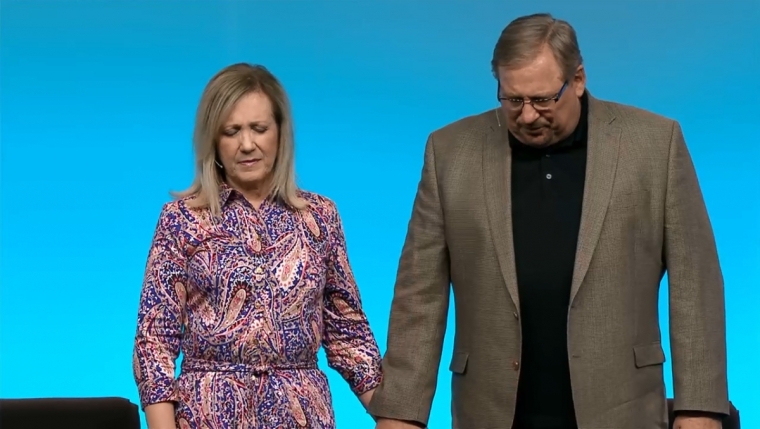Mentally vulnerable need treatment not jail, church leaders told

Lake Forest, Calif. (Christian Examiner)—Governmental, medical and law enforcement leaders told attendees of Saddleback Church's Gathering on Mental Health and the Church that faith groups have a vital role in helping some of society's most vulnerable groups get help for their mental illnesses.
For example, Paolo del Vecchio, director of the Substance Abuse and Mental Health Services Administration's Center for Mental Health Services, points to the homeless population. Del Vecchio says that one third of the homeless in the United States has a mental health or addiction problem.
"The importance of us reaching out to those individuals to provide, frankly, the support, the love, the fellowship that faith communities bring is incredible," del Vecchio said.
The words came during the fourth plenary session of Saddleback Church's second Gathering on Mental Health and the Church. The session focused specifically on ministry to vulnerable groups, such as the homeless, the chemically dependent and veterans. Rick and Kay Warren initiated the conference last year after their son, Matthew, died tragically following a lifetime of fighting mental illness. More than 2,200 people attended the two-day conference Oct. 8-9 at the church's Lake Forest campus. Nearly 4,000 additional people watched the conference for free online.
"When we talk about mental health, we specifically have to talk about some very vulnerable groups," Rick Warren said. "You can't talk about veterans returning with post-traumatic stress disorder without talking about mental health. You can't talk about addictions and co-dependencies without mental health. You can't talk about the homeless without mental health."
According to the leaders Saddleback assembled during the session, faith communities play a critical role in positively impacting the lives of the mentally ill. They encouraged the faith leaders in attendance to make mental health ministry a priority.
"Research shows that people with a strong faith show fewer symptoms of depression, that beliefs such as compassion, love and forgiveness, reduce stress and anxiety," Del Vecchio said.
When dealing with mental health issues facing returning veterans, Dr. Glenda Wrenn said a general lack of awareness in the public of military culture contributes to the problem. She talked about how the "warrior ethos" in the military makes it more difficult for veterans to talk about mental health problems compared to physical health problems. Understanding this culture is a key way that religious organizations can support returning veterans.
"If your heart breaks about the fact that military women are six times more likely to die by suicide than women who haven't served, and if it disturbs you to hear that 1 in 4 women veterans and 1 in 100 male veterans who are getting services at the VA have disclosed a history of military sexual trauma and if that bothers you enough to do something about it, you're going to have to get equipped. You're going to have to have information," said Dr. Wren, who serves as the director of the division of behavioral health of Satcher Health Leadership Institute at the Morehouse School of Medicine in Atlanta, Ga.
The panel was also clear on the consequences of not helping vulnerable populations with mental illnesses. Yost Zakhary, city manager for Woodway, Texas, and a longtime chief of police, expressed dismay over the number of people put in jail that need to be treated for mental illness.
"The last place these people need to be is in jail or prison," said Yost Zakhary, city manager for Woodway, Texas, and a former chief of police. "They lose their medication. They lose their families. They lose their support system. Now we have to start the whole cycle over again. These medications do not [help] overnight. They are never designed to be eliminated overnight."
Each of the leaders during the fourth plenary session highlighted the ability of faith communities to decrease the stigma associated with mental illness and chemical dependencies. Michael Botticelli, the director of national drug control policy, highlighted how negative stereotypes of people with drug and alcohol addictions can greatly harm the recovery process.
Botticelli pointed specifically to one study where those with chemical dependencies were labeled either a substance abuser or a person with a substance abuse disorder. He said that even among medically trained clinicians, there was a more punitive response toward those labeled as substance abusers.
"Faith leaders obviously can play a vital role in this effort," Botticelli said. "You inspire people daily and encourage them to be healthy for their family and friends. The message you tell can change the misperceptions and stereotypes about people with these disorders. You can also reveal the true consequences of drug use that are sometimes ignored. Fundamentally, by putting faces and voices to this disease, we can lift the curtain of shame and denial that continues to leave too many people with substance abuse disorders hidden and without life-saving treatment."
The panel recommended faith leaders to highlight the stories of those in recovery from mental health illnesses or additions.
"It's really impossible to keep a stigmatizing view when you're face-to-face with someone in recovery," said Dr. Wrenn.